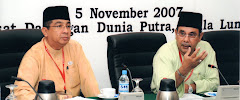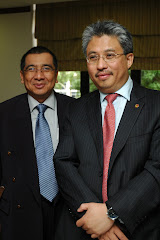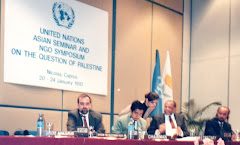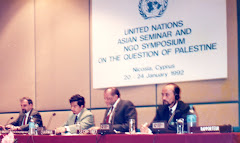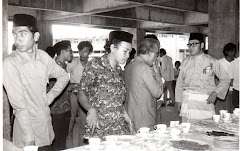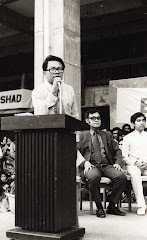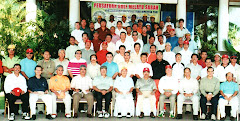The founding chairman of Petronas and its first CEO, Tengku Razaleigh Hamzah said that the federal government in Putrajaya under Mahathir has been treating the oil and gas corporation as a cash cow, especially in bailing out government-linked companies in financial trouble.
https://www.thecoverage.my/3453/tengku-razaleigh-mahathir-squandered-from-petronas-rm-529-billion-since-1970s-bailed-out-mirzan-mokhzani#lfgp2rf1viklv18rn18
Petronas provided the money to build some of former Prime Minister Mahathir Mohamed’s most grandiose projects, including the KL Twin Towers, the Putra Jaya administrative capital and to bring Formula One racing in Malaysia.
Petronas was used to get Malaysia out of an RM31.5 billion forex scandal perpetrated by Mahathir in the early 1990s in which the financier George Soros outfoxed Bank Negara, making billions and earning Mahathir’s eternal antagonism. It paid off US$800 million in losses from Mahathir’s ill-fated Perwaja Steel project. In 1998, it bailed out Mahathir’s eldest son Mirzan, purchasing his Konsortium Perkapalan for RM226 million and assuming debts of more than RM324 million. It also awarded in 2012 a RM700 contract to a firm in which Mahathir’s other son Mokhzani was a vice president.
Tengku Razaleigh, or Ku Li, said that since its inception in 1974, Petronas has paid out RM529 billion to the government in the form of dividends, taxes, petroleum revenue and export duties.

NEWS
Mahathir Squandered From Petronas RM 529 Billion Since 1970s – Bailed Out Mirzan & Mokhzani
20 March, 2023
361 Views
Shares0

The founding chairman of Petronas and its first CEO, Tengku Razaleigh Hamzah said that the federal government in Putrajaya under Mahathir has been treating the oil and gas corporation as a cash cow, especially in bailing out government-linked companies in financial trouble.
recommended by



QUANTUM CODE
This Video May Soon Be Banned. Watch Before It's Deleted
LEARN MORE
Petronas provided the money to build some of former Prime Minister Mahathir Mohamed’s most grandiose projects, including the KL Twin Towers, the Putra Jaya administrative capital and to bring Formula One racing in Malaysia.
Petronas was used to get Malaysia out of an RM31.5 billion forex scandal perpetrated by Mahathir in the early 1990s in which the financier George Soros outfoxed Bank Negara, making billions and earning Mahathir’s eternal antagonism. It paid off US$800 million in losses from Mahathir’s ill-fated Perwaja Steel project. In 1998, it bailed out Mahathir’s eldest son Mirzan, purchasing his Konsortium Perkapalan for RM226 million and assuming debts of more than RM324 million. It also awarded in 2012 a RM700 contract to a firm in which Mahathir’s other son Mokhzani was a vice president.
Tengku Razaleigh, or Ku Li, said that since its inception in 1974, Petronas has paid out RM529 billion to the government in the form of dividends, taxes, petroleum revenue and export duties.
PROMOTED CONTENT



This Video May Soon Be Banned. Watch Before I
He also said the government’s reliance on Petronas to rescue financially floundering government-linked companies (GLCs) had been going on since 1985.
Ku Li was the Minister of Finance from 1974 to 1984.
In 1985, Petronas bailed out Bank Bumiputra with a Rm2.5 billion infusion. In 1991, Petronas shored up the banks’ finances again when it pumped in an additional RM1 billion.
In 1997, he said Petronas had to rescue the troubled Konsortium Perkapalan Berhad for RM2 billion.
He added that Petronas was made to underwrite the construction of the KLCC Twin Towers for RM6 billion and the construction of Putrajaya for a further RM22 billion.
“This amount could have been used more productively to fund a national pension programme for Malaysians, as has been done by a certain Scandinavian country,” he said in his speech at the launch of the book “Rich Malaysia, Poor Malaysians” at the Sultan Sulaiman Club in Kuala Lumpur last night.
The bailout and construction of mega projects was done during the premiership of Tun Dr Mahathir Mohamad, who initiated a series of major infrastructure ventures in the 1990s.
Ku Li said the exorbitant amount of the bailout and construction of these projects that was forced onto Petronas had also deprived the company from the much needed cash build-up for reinvestment, which would ensure its business sustainability.
He said today Petronas was on par with oil majors and was ranked as one of Fortune 500’s largest and profitable oil and gas companies.
“But sadly, it is being abused and treated as the piggy bank whenever the government needed cash in a hurry,” he said.
Ku Li said while subsidising of consumer goods was not the most efficient of ways in managing the high cost of living, it was fairly understandable if the government extended a helping hand to the small man.
“What is sinful and cannot be forgiven is the ease with which the powers that be had been dishing out subsidies to such entities like the national power supplier, the independent power producers and some other non-power outfits,” he said.
During the last few months of Mahathir’s second stint as prime minister, he tried to look at possible ways Petronas could raise funds. One of his ideas was to break up Petronas into smaller business units, the Petronas Chemicals Group, Petronas Carigali, and Petronas Gas, selling equity off to Sabah and Sarawak state governments.
With tourism, air transport, and logistics depressed, national governments, including Malaysia will have to go deeper into deficit financing to pump their respective economies.
This is a dilemma for Petronas which will be under extreme pressure to pay some form of dividend to help the government manage the forthcoming budget. Without help from Petronas, the finance minister will have to canvas a reintroduction of the GST, maybe even at a higher rate than previously, increases of income and corporate tax, and even the introduction of new taxes. The company has been a major contributor to Malaysia’s wealth. However, times are changing where it may not be a dependable lifeline for much longer.






























